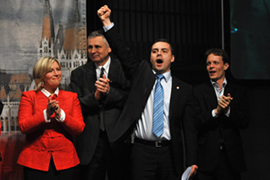Centre-right wins Hungary polls
Ruling Socialists humiliated while far-right anti-Gypsy party makes strong gains.

Orban comeback
The governing Socialists, whom many Hungarians blame for their dismal economy, were far behind with 28 seats, just two more than Jobbik’s haul.
The depth of the Socialist fall was reflected in a comparison of their present showing to that of the last election four years ago, when they garnered 43 per cent support.
A green party, Politics Can Be Different, exceeded expectations with 7.4 per cent and five seats ahead of a second round on April 25 when the fate of the remaining 111 seats is decided in runoffs for 57 constituencies where no candidate got at least half the votes.
Viktor Orban, the Fidesz leader who was prime minister from 1998-2002 but lost two elections in 2002 and 2006, addressed a cheering crowd gathered outside the party’s election headquarters at downtown Vorosmarty Square on Sunday.
“Today Hungarians again raised their head and condemned a whole era … they drew a line under an era which has failed and chose unity, order and safety,” Orban said.
“I can see that there is complete joy … but at the same time I know deep in my heart that I stand before the biggest task of my life.”
Rise of the far-right
 |
| Jobbik campaigned on a platform blaming Jews and Gypsies for many of Hungary’s woes [EPA] |
Jobbik, which burst on to the political scene last year with a nationalist platform blaming Gypsies and Jews for many of the country’s problems, claimed that only a series of scandals about some of its candidates created by the media prevented it from overtaking the Socialists.
“Despite the strong headwinds, Jobbik has managed to double its voters over the past year,” Gabor Vona, the party’s president, said after preliminary results were announced by the National Election Office.
“I still feel, however, that two-thirds of Hungarians are Jobbik supporters but don’t know it yet.”
Jobbik has been able to inflate the traditional, relatively small base of extreme nationalists and anti-Semitic supporters with voters from Hungary’s struggling country villages where the lack of jobs and poverty-related thievery has exacerbated tensions with Gypsies, or Roma, as they are also called.
Jobbik’s rise also has been aided by the popularity of the Magyar Garda, or Hungarian Guard, an extremist group whose uniforms are reminiscent of those worn in the 1940s by the Arrow Cross, Hungary’s infamous wartime Nazi party.
The Garda was co-founded by Vona, although he is no longer an active member.
It was disbanded last year by the courts for breaking laws governing the operation of groups and associations, but it continues to exist under a new name.
The Garda’s most confrontational actions have been a series of marches through small countryside towns and villages meant to intimidate their large Gypsy populations and stop what Jobbik calls “Gypsy crimes” – mostly petty thefts too numerous and considered too minor for police to deal with.
The Socialists owed their stunning defeat to loss of credibility amassed during eight years of government and deeply unpopular austerity measures imposed in the past months.
Despite the euphoria of Fidesz supporters, the party has a difficult task ahead, with a recession which saw the economy contract by 6.3 per cent last year and unemployment at a high of 11.4 per cent.
Orban ran a cautious campaign that steered clear of details on how he would cut taxes and “create 1 million jobs in 10 years” as he sought to leverage his party’s high popularity ratings ahead of the vote.
He has been extremely careful on taking a stand on anything that may damage him or his party, but he will need to quickly lay out a consistent and credible strategy after the second round of elections on April 25.
“He will face, by far, the biggest task of his career,” political scientist Peter Tolgyessy told the Magyar Narancs weekly prior to the vote.
Orban will have to live up to voters’ hopes of bringing a palpable improvement in their lives and in the economy but will also have to lay out an economic plan acceptable to international lenders, the IMF and the EU, whose financing line kept the country afloat after the October 2008 solvency crisis.